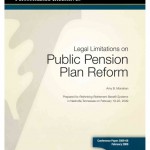Legal Limitations on Public Pension Plan Reform
 There is significant interest in reforming retirement plans for public school employees, particularly in light of current market conditions. This paper presents an overview of the various types of state regulation of public pension plans that affect possibilities for reform. Several states have legal protections that effectively prevent a state from making any changes to its retirement plans that would reduce the monetary value of an employee’s pension from what he or she would have earned under the terms of the plan in effect on the employee’s date of hire. Many other states allow changes to their pension plans only if any disadvantages of the plan amendment are offset by comparable new advantages for participants. Other states allow retirement plan changes as long as participants have been afforded due process. Nearly all of the various approaches to public pension plan protection taken by the states have significant flaws. These flaws include a lack of clarity regarding what plan changes the relevant legal standard will allow, combined with either too much or too little protection for plan participants. This paper argues that states would be well served to adopt the approach used by the federal government with respect to pension plans. The federal approach protects plan participants’ currently accrued benefits, but gives employers freedom to change plan terms going forward. This approach is clear, protects legitimate participant interests, and preserves an employer’s ability to respond to changing economic conditions.
There is significant interest in reforming retirement plans for public school employees, particularly in light of current market conditions. This paper presents an overview of the various types of state regulation of public pension plans that affect possibilities for reform. Several states have legal protections that effectively prevent a state from making any changes to its retirement plans that would reduce the monetary value of an employee’s pension from what he or she would have earned under the terms of the plan in effect on the employee’s date of hire. Many other states allow changes to their pension plans only if any disadvantages of the plan amendment are offset by comparable new advantages for participants. Other states allow retirement plan changes as long as participants have been afforded due process. Nearly all of the various approaches to public pension plan protection taken by the states have significant flaws. These flaws include a lack of clarity regarding what plan changes the relevant legal standard will allow, combined with either too much or too little protection for plan participants. This paper argues that states would be well served to adopt the approach used by the federal government with respect to pension plans. The federal approach protects plan participants’ currently accrued benefits, but gives employers freedom to change plan terms going forward. This approach is clear, protects legitimate participant interests, and preserves an employer’s ability to respond to changing economic conditions.
To read this paper, please click here.
To read comments on this paper, please click here.
Connect with Vanderbilt
©2026 Vanderbilt University ·
Site Development: University Web Communications